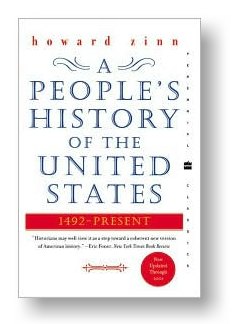January 29, 2010
Written by C.N.
Remembering Howard Zinn and His Influence on My Life
Earlier this week, well-renowned and respected professor, author, and social activist Howard Zinn passed away at the age of 87. Professor Zinn is most famously known for writing A People’s History of the United States and for being a vocal and active anti-war and civil rights activist. The New York Times’s obituary provides more details of his life:
Published in 1980 with little promotion and a first printing of 5,000, “A People’s History†was, fittingly, a people’s best-seller, attracting a wide audience through word of mouth and reaching 1 million sales in 2003. Although Professor Zinn was writing for a general readership, his book was taught in high schools and colleges throughout the country . . .
“A People’s History†told an openly left-wing story. Professor Zinn accused Christopher Columbus and other explorers of committing genocide, picked apart presidents from Andrew Jackson to Franklin D. Roosevelt and celebrated workers, feminists and war resisters. . . .
He attended New York University and Columbia University, where he received a doctorate in history. In 1956, he was offered the chairmanship of the history and social sciences department at Spelman College, an all-black women’s school in segregated Atlanta.
During the civil rights movement, Professor Zinn encouraged his students to request books from the segregated public libraries and helped coordinate sit-ins at downtown cafeterias. He also published several articles, including a rare attack on the Kennedy administration, accusing it of being too slow to protect blacks.
He was loved by students — among them a young Alice Walker, who later wrote The Color Purple — but not by administrators. In 1963, Spelman fired him for “insubordination.†(Professor Zinn was a critic of the school’s non-participation in the civil rights movement.) His years at Boston University were marked by opposition to the Vietnam War and by feuds with the school’s president.
Professor Zinn retired in 1988, spending his last day of class on the picket line with students in support of an on-campus nurses’ strike. Over the years, he continued to lecture at schools and to appear at rallies and on picket lines.

I never had the privilege of meeting Professor Zinn or seeing him speak, but he was still a strong influence in my life and my career. Professor Zinn was a role model of an activist academic — someone who did not try to pretend that everything he taught, researched, or write about would be completely objective or unbiased.
Instead, he was not afraid to take a stand on controversial issues and just as important, Professor Zinn was willing and indeed eager to get out of the isolation of the college campus (the “ivory tower” as many call it) and go out into the cities, neighborhoods, and communities where discrimination was taking place and to physically contribute to the struggle for social equality.
It is also notable, at least for me, that as a White American, Professor Zinn acknowledged and personally owned how the legacy of racial inequality in the U.S. had benefited him and that because of his racial identity, he was privileged in many ways. But rather than just implicitly recognizing his privilege, he used it to give back to the less-privileged.
Professor Zinn’s example is one that I have tried to follow, with this website and blog being one way for me to try to continue his legacy of using your knowledge to make a contribution to the cause of true human equality — to not just talk the talk, but also walk the walk.
Thank you Professor Zinn, may you rest in peace, and may your life continue to inspire others.
Author Citation
Copyright © 2001- by C.N. Le. Some rights reserved. 
Suggested reference: Le, C.N. . "Remembering Howard Zinn and His Influence on My Life" Asian-Nation: The Landscape of Asian America. <https://www.asian-nation.org/headlines/2010/01/remembering-howard-zinn-influence-my-life/> ().
Short URL: https://www.asian-nation.org/headlines/?p=1565
Tags:
Translate Into Another Language![]()

